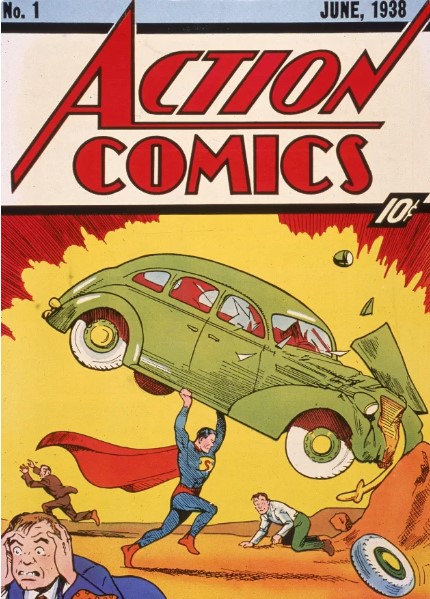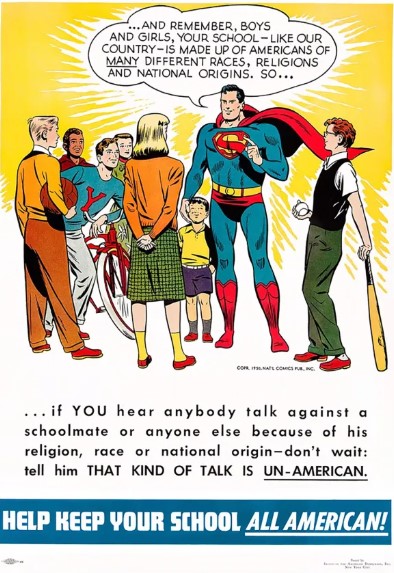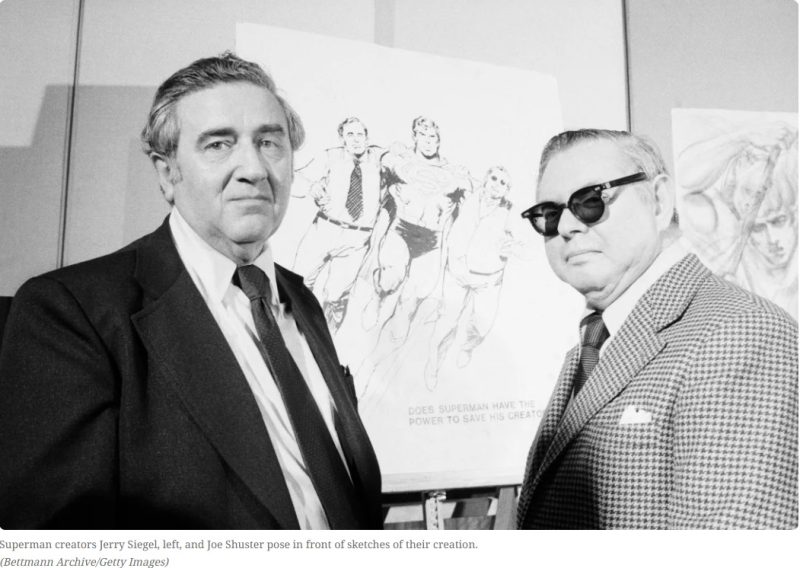Faster than a speeding bullet. More powerful than a locomotive. Able to leap tall buildings in a single bound. Look up in the sky! It’s bird! It’s a plane! It’s. . .Superman!
Eighty-seven years ago (1938), a baby arrived in America from a home in turmoil. A family in Kansas raised him, and he struggled to balance two identities. This was the beginning of Superman comics and has been the backstory ever since. The first Superman story stated he was sent to Earth from Krypton, a fictional doomed planet. His origin provided a convenient plot device: it explained his superpowers.

The comic book Action Comics No. 1, published in June 1938. (Hulton Archive/Getty Images)
Superman’s motto was to fight for “truth, justice, and the American way.” James Gunn, the director of Superman, told the Times of London, “For me, it (Superman) is mostly a story that says basic human kindness is a value and is something we have lost.” The first page of the Superman story describes Superman as a “champion of the oppressed.”

The image above was originally produced in 1949 and distributed to schools by the Institute for American Democracy, an offshoot of the Anti-Defamation League. The art team at DC digitally restored the poster in 2017.
Jerry Siegel and Joe Shuster, the creators of Superman, wrote Superman’s story as World War II loomed. While fascism rolled through Europe and echoed in the United States, Superman’s early adventures show him fighting “for the little guys, for abused women, for exploited mine workers, and against corrupt politicians,” said Danny Fingeroth, author of Superman on the Couch: What Comic Book Heroes Really Tell Us About Ourselves and Our Society. Throughout his adventures, Fingeroth tells us “Superman is the immigrant embodying the best of American qualities, even though he’s from somewhere else.”

Like Superman, the large majority of superheroes are outsiders. That’s the common thread that gives them staying power for people from many walks of life. Other immigrant superheroes include Green Lantern (beings from various planets), Wonder Woman (from a fictional island), Star Wars characters (from a galaxy far, far away), and even Deadpool (Canada). Check Google for more.
Unfortunately, in these divisive times, everything seems to be political and, with immigration crackdowns ramping up, right-wing media is referring to the new Superman movie as “Superwoke.” My CNN newsfeed today reported that Kelly Ann Conway, a former Trump adviser, said, “We don’t go to the movie theater to be lectured and to have somebody throw their ideology on to us.” In contrast, Define American founder Jose Antonio Vargas and narrative strategist Andrew Slack wrote in The Hollywood Reporter, “You can’t politicize the truth. Superman has been an ‘illegal alien’ for 87 years.”
It’s not surprising that, last week, the White House’s social media accounts shared an AI-generated image of the movie poster depicting President Trump in the title role. Sadly, however, that post was soon followed by one from the Department of Homeland Security, which shared the iconic image of ET’s bicycling silhouette with text superimposed over the moon saying, “GO HOME.”
Superman is a fictional and thus, an imaginary, character. Does everything have to be political? Still, Kelly Ann is partially right: We don’t select movies based on our political ideologies and we don’t go to the movies to be lectured or to politically analyze them. We go to the movies to have fun, to find adventure, to feel thrills, and to laugh—and maybe during this heat wave, to stay cool.
Dean Cain, now a conservative commentator, said the Superman director’s decision to invoke immigration while promoting the film could be a costly mistake. So far, he’s wrong. The movie finished in the Number One position on its opening weekend and continues to draw large audiences. It topped the box office again in its second week. It has now grossed $235 million in the United States and $406.8 million worldwide. It looks like a lot of people just want to have fun.
The Superman comic books were my favorites when I was a child. I remember buying them for 10 cents each and re-reading them over and over because I enjoyed them so much. Ted and I are going to see Superman, and we’re going to have fun watching it for 2 hours and 9 minutes with no political commentary. 😊
Author’s note: To provide full disclosure, I based this post on an article in CNN. It incensed me to read that people are slamming an imaginary character, with a reputation as a champion of the underdog, as being woke (according to their definition of the word). Even worse, in my opinion, they are trying to take the fun out of a fictional movie by describing it as pro-immigration propaganda. Someone had to speak up for Superman, and because I’ve always liked him–fictional or not–I decided it should be me.